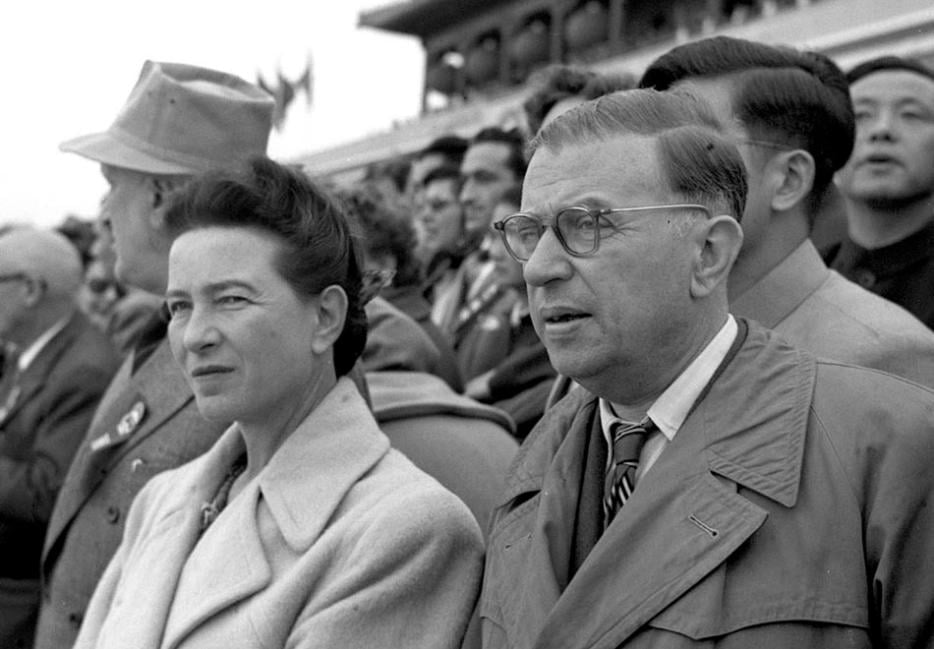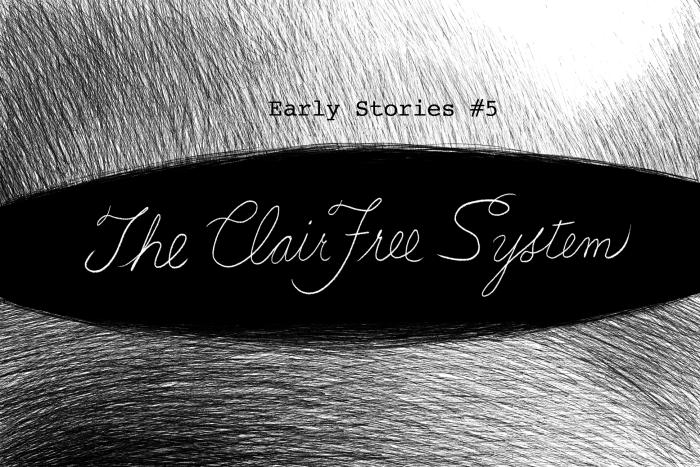There’s something embarrassing about capital-e Existentialism, perhaps because of the number of us who were drawn to it as disaffected teens, browsing the ideological Lazy Susan while bumming smokes off of the big kids. And yet that youthful appeal was what brought historical biographer Sarah Bakewell back to the philosophy that she had so loved during her moody adolescence.
Existentialism was and is an identity as much as a philosophy, and Bakewell’s recent ensemble biography, At the Existentialist Café: Freedom, Being, & Apricot Cocktails, tracks the genesis of both the philosophy and the characters who made it ubiquitous. As the title implies, Bakewell is interested in the cross-pollination that occurred within the metaphorical garden of existentialism: who said what to whom, which of them were lovers, and briefly—why did Koestler punch Camus?
The follow-up to 2011’s How to Live, a biography of Michel Eyquem de Montaigne, At the Existentialist Café offers an astute historical primer for those looking to deepen their knowledge of phenomenology and existentialism, as well as the juicy details of what went on after all the apricot cocktails were quaffed.
Naomi Skwarna: You wrote that existentialism was dear to you as a teenager, that it in fact led you to drop out of high school to pursue your own path. What led you back to the existentialists?
Sarah Bakewell: It was a return to an early love. I studied philosophy at university and started a PhD on Heidegger, which I didn't finish because I kind of fell out of love—or I lost the sense of "why am I doing this." I abandoned it to do completely different things. [I ended up] writing historical non-fiction—biographies, basically. And from there into the Montaigne book. But that took me back in the direction of philosophy, specifically Maurice Merleau-Ponty on Montaigne, which claims him as the first phenomenologist. Because of the way that he writes about experience, his own changing self and his take on the world throughout his life.
What was different on the return?
The first time, I was very young, completely swept off my feet by the sheer excitement of the ideas. Now I'm returning to it old and cynical and with a more critical perspective.
Much of the book is rooted in the relationships between the philosophers, which makes for a tangled web, at times.
What really fascinates me is how they all related to each other, how in their thinking they were always responding to something that someone else had said or written about. They were reading each other, disagreeing with each other, getting into fights—sometimes physical ones! Even if they never met, there was a line of inheritance. Everybody was reacting to what had been written before. There was this anxiety of influence: everyone trying to stake out their very different take on subjects, distinguishing themselves from what other people had said before.
Not unlike the present culture of hot takes.
What was unusual was that personal quality—the inhabiting of ideas, a whole philosophy, and living it out in a personal way. That's part of the existentialism itself— concrete existence, and what you actually choose to do and how you respond to other people. It's a living philosophy. It's more intimately linked to what they do in their personal lives. For example, the fact that Sartre and Beauvoir had their open relationship, which wasn't just a random personal choice, it was closely linked to their philosophy of freedom.
You located a lot of the philosophy in the character and relationships of key thinkers, like Sartre and Beauvoir. Could you be an existentialist purely in action? Or did you have to be a philosopher and think, and talk, and write about it?
In a way, you could be at the time when it was fashionable, you could say, "I'm an existentialist" just because you went to the cafés and bars; if you danced and wore the right clothes, which in the early days was the plaid shirt and a raincoat. Looking back on that period, that seems more like a fashion than a philosophy. Philosophy, at some point, has to be written down, has to be preserved in a way that makes some kind of sense to later generations. Existentialism is a philosophy with a recognizable heritage—Kierkegaard, on the one hand, is clear precursor in the 19th century; little bits of Nietzsche, little bits of Dostoevsky, and then the phenomenologists [like Merleau-Ponty]. Everybody wrestles with a bit of existential anxiety. That's just a part of being human. Phenomenology provided a philosophical method, and the older existentialist tradition provided the anxiety. You put those two together and you've got a real set of ideas.
Existential thought seemed to thrive in conflict. Was that level of drama necessary for the philosophy to develop?
I don't think it's so much that it thrived in that atmosphere, it's just that existentialism arose in a time when there were huge questions to be asked after the end of the Second World War. What was the political future of the world, on the most fundamental level, after Hiroshima? How were we going to ensure that the human race didn’t wipe itself out? Both Sartre and Camus made very memorable statements, basically: from now on, the human race has to decide that it wants to live, every day. It's an existential decision because it's up to us. The human race is free to decide whether we're going to wipe ourselves out. It's a powerful but scary thought.
Could you project existentialism onto the political choices that carried from there?
Well, the decisions that were being made, at the time of the Cuban Missile Crisis for instance, were totally existential. Are we going to stand on our pride and insist on a confrontation? Are we going to do some deal, and if so how? These decisions were all about: what are we going to do before a huge chunk of the human race is destroyed? It arose out of devastation after the Second World War and the loss of moral authority. All of the traditional sources of certainty didn't work out. They needed to find some way of taking control of human and political relationships. Existentialism picked up on that desire for newness and, like Communism, also seemed to offer an opportunity for humanity.
Do you see echoes of existential inquiry in current protests?
In a sense, I see a lot of the same things happening now—or it should be. There's this new movement going on in France at the moment, people staying out all night and objecting to pretty much everything. It's called Nuit debout and it's a lot like the Occupy Movement. It's partly in response to everything that's happened in France recently with the terrorist attacks, and the crackdown that followed and the crises that have been going on with the treatment of refugees. They're even doing this very French Revolutionary thing where they've sort of reinvented their own calendar where they’re up to now, something like the [54th] of March. It's refreshing that things like that are still occurring.
Speaking of pervading principles of existentialism, do we take authenticity to mean the same thing as Sartre?
At it's worst, [our current version of] authenticity can become more like a fashion statement, and of course there's a lot of money in it—authenticity can be bought and sold. That's not what the existentialists were talking about. They were talking about taking ownership of your own personal choices, of what you do and how you engage yourself with the world of others. Of course, it's not really possible to live authentically all the time—not to have any bad faith or self-deception. We need a little bit of that.
If you accept any Freudian idea of an unconscious, there are so many things we don't even know about ourselves.
That's an interesting one, because Sartre was very uneasy about Freud. He kind of rejected the whole notion of the unconscious, because he had to. It didn't fit with his philosophy.
You do such a wonderful job of mapping out these figures and their connections to one another. Sartre seems both magnetic and totally insufferable.
Yes, I think he'd be someone to spend an evening with before he starts to grate on you; his incessant energy for a start, although some of that energy was fuelled by his amphetamine habit. He was tireless, both in his writing and conversation.
Did you feel a particular affinity for any one of the people you wrote about?
I very much like the character and the work of Merleau-Ponty, who was not really an existentialist. He was a phenomenologist, but he moved in the same circles. He didn't write very much about anxiety. He'd had a happy childhood, always felt loved, he was basically happy. Beauvoir, when she was young thought, "I couldn't possibly be with someone who is that comfortable with himself." He was quite happy as well to be from a bourgeois family. He was like "that's fine! I love my family."
And it was Merleau-Ponty's writing that brought you back to the existentialists?
Yes. The Phenomenology of Perception is his masterwork, and I reread that with great interest. But in his final, unfinished book, The Visible and the Invisible, he was trying to write about how the mind and the world intersect. The traditional philosophical idea is that the mind is one insubstantial thing, or the soul is one insubstantial thing, not in the physical world. And then there's the body and the world and everything in it. The puzzle is: how are they linked? Sartre portrays a dualist world—there's the mind, which is literally a nothingness, and then the physical world, the body and the rest of it, which is something. But Merleau-Ponty says the two can't be divided. Consciousness and the world are woven into each other in such a way, he talks about the figure of the chiasm— this 'x' shape—and everything is closely knit. Consciousness, he describes as being like a little fold in the world, a little pocket. All of that was part of his lifelong job of trying to describe what human experience is. We're embodied, and having a body is part of our experience. You can't divide that out from being a person.
How can we benefit from existential insight right now?
We can't cut and paste ideas from existentialism, but we can try to understand them in their own time, which is what I do. But having done that, I also found myself quite often thinking: oh yeah, that's something that's very much on our minds now, the whole question of freedom. Personal liberation, women's liberation, civil rights, LGBTQ rights. All of those movements—the freedom to offend, freedom of speech, and freedom from surveillance. What about privacy? How do we balance freedom and security? We're always being told we need to give up our civil rights in return for "more" safety. How do we balance those things?
And how it changes so much based on what's threatening those freedoms.
Yes, it does. Freedom is an easily abused word; it can be used to serve all sorts of political ends that have got nothing whatsoever to do with freedom. Existentialist ideas of freedom don't sort out those problems, but they do highlight how difficult and important the question is. It didn't start or end with the existentialists. It's just a part of what it is to be human.






